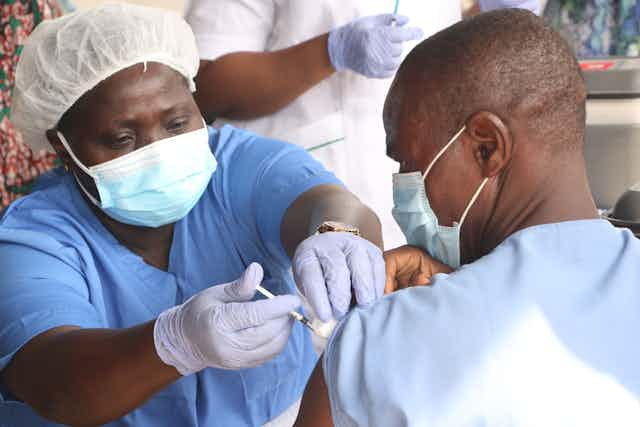Two states in Nigeria – Edo and Ondo – recently announced compulsory COVID-19 vaccinations for adults. Even after a court restrained the Edo State government from going ahead, it insists the order stands. The Federal Government is also considering making COVID-19 vaccination compulsory for civil servants. Abiodun Odusote weighs in on the legality of these orders.
Do state governments have the legal authority to compel vaccination of adults?
At the moment, mandatory COVID-19 vaccination in Nigeria is illegal. I am not aware of any legislation or regulation that mandates Nigerians to take vaccines. Mandatory COVID-19 vaccination cannot be made by oral proclamation like what happened in these two states. It must be based on legislation or regulation based on public health and safety otherwise the actions of the state functionaries will amount to violations of citizens’ right to privacy, right to movement and right to religious life.
I agree that making COVID-19 vaccination mandatory could be reasonably justified for contagious and serious diseases like COVID-19 because there is a real and grave threat to public health and safety. This reasoning would make such an order compliant with Section 45 of the Constitution. However, there must be a law or regulation to that effect. I am not aware of any at the moment.
There are other issues to consider too. How many people have been vaccinated in Nigeria at the moment? Just over four million out of a population of over 200 million. That’s not up to 2% of our population. Have we interrogated the reasons behind this abysmally low level of vaccination? Are we sure we have enough vaccines to go round? Are we sure the majority of the people are aware of the need and importance of being vaccinated? Have we tried to educate the majority of the people? Are we dealing with deliberate refusal to get vaccinated or are we dealing with vaccine hesitancy? Or are people refusing vaccines for religious reasons?
The government at all levels must provide scientific explanations to these posers before the announcement of a policy of compulsory vaccination. Answers to these questions should inform its response. I am aware that there are more than a few people that would like to be vaccinated but have not been privileged to have a jab. I know of some others that for religious reasons, they prefer not to be vaccinated. Concerns over vaccine safety still remain. Obviously, encouraging these groups to get vaccinated will require different approaches. Making vaccination compulsory is not the only way to obtain high vaccination rates. Research into how to further improve uptake rates among vaccine-hesitant citizens is more important than mandatory vaccination.
It should be noted however that mandatory vaccination has been used to achieve great results in some other countries in respect of child immunisation. Singapore, Belgium, Slovenia and some countries in the Americas – 29 – have mandatory vaccinations.
But coercion through compulsion might not be effective in Nigeria. It may be counterproductive as it has the potential to lend credence to conspiracy theories. Why not be bothered about many dying because of cholera and insecurity? Why the overdrive in respect of COVID-19 vaccination when many more are dying as a result of malaria and insecurity of lives and properties. Government should educate and provide incentives for vaccination rather than threatening and coercing citizens.
What legal options are available for citizens to fight this?
Mandating vaccinations for COVID-19 raises many complex and difficult legal questions concerning the interplay of competing human rights. On the one hand there is the issue of health and safety. On the other personal human rights.
There cannot be interference with the human rights of citizens unless:
it is in accordance with law, and
is necessary for the protection of health and safety or rights and freedoms of others.
In the context where mandatory vaccination is being proposed without extant regulations or laws, aggrieved citizens can bring an application to enforce their fundamental rights to privacy, movement, religious beliefs and threatened violation of the right to bodily integrity.
They can also seek to have the order set aside by asking for an order for declaratory relief declaring the mandatory vaccination policy illegal and therefore null and void for failure to follow due process of law. Such an injunctive order would restrain the government from implementing the compulsory vaccination policy.
Are there any historical precedents?
During the colonial period in northern Nigeria, there was vaccine hesitancy which resulted in considerably fewer smallpox vaccinations being carried out in the area. The colonial administration introduced a Vaccination Ordinance, originally enacted in 1917. In 1945, the Ordinance was amended to include a schedule for compulsory vaccination of adults and their children to be organised by local political authorities.
The Native Authority officials were emirs and traditional chiefs and were responsible for determining penalties for non-cooperation. They had little means of enforcing the penalties. Not much success was recorded.
After independence Nigerian governments took a different approach to national vaccination. Primary health centres were established across the country and citizens were educated and implored to vaccinate their children. Many international NGOs were involved including the Bill & Melinda Gates Foundation as well as state governors and politicians.
With these, tremendous success was recorded especially poliomyelitis. Consequently Nigeria was declared polio free on 25 August, 2020.
I recommend a similar approach for the COVID-19 vaccination and not mandatory vaccination.

